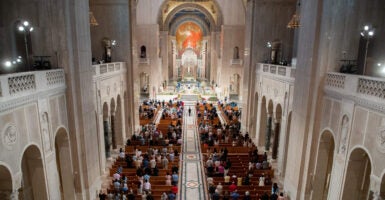Nearly 70% of registered voters believe that Jesus Christ physically rose from the dead, and more than 70% plan to celebrate Easter this year, a new poll finds.
A Scott Rasmussen National Survey poll, conducted March 20 and 21 among 1,000 registered voters, found that 73% of respondents will celebrate Easter this year. When asked whether they would celebrate the holiday primarily as a religious holiday or as a secular holiday, 56% of participants responded with religious, 16% said secular, and 27% said both secular and religious equally.
The poll reflected voters’ belief that Jesus physically rose from the dead, by a margin of 68% to 13%.
Participants were asked to select which religion or faith best described what they practice. The survey found that Bible-believing Christian, Protestant, and Catholic each drew 21% of those polled. Evangelical Christian was chosen by 12%. Jewish identity made up 2% of the poll participants, with 1% Muslim and 6% atheist. The option “none of the above” was selected by 16%.
Some 49% said they were “very likely” to go to church on Easter Sunday, and 23% were somewhat likely, while 10% said they were not very likely, and 16% said they were not likely at all to do so.
Respondents were also asked how often they attend church, synagogue, or other religious services. Some 49% of participants said they rarely or never attend a religious service, while 23% said they go once a week, 12% said they go a couple of times a month, and 6% said once a month. About 9% of voters said they attend some form of religious services more than once a week.
Those polled were also asked about their prayer habits; specifically, how often they pray in a week. Some 45% of participants answered every day or nearly every day, and 21% said they pray several times a week, while 18% said they rarely or never do, 7% said about once a week, and 6% said less than once a week.
Again, regarding the upcoming Christian holiday, voters were asked whether they view Easter as one of our nation’s most important holidays, least important holiday, or somewhere in between. The latter view received 48% support, while 33% of voters said Easter is the nation’s most important holiday, and 15% of voters said Easter is the least important.
Respondents were asked whether a series of statements were true or false. They were asked to evaluate whether “the man known to history as Jesus Christ actually existed and walked the earth,” or not.
By a margin of 83% to 5%, voters said they believe that Jesus Christ did in fact exist and walked the earth.
The margin of error for the survey was plus or minus 3.1 percentage points, according to Rasmussen.































